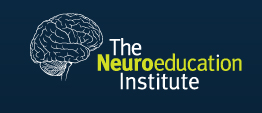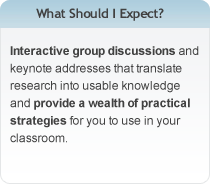
The Neuroeducation Institute
Applying Brain Science to Teaching & Learning
July 29-30, 2010
Montgomery Bell Academy,
Nashville, TN
The Neuroeducation Institute is a two-day, intensive and collaborative opportunity for educators to come together to enhance their teaching through discoveries about the brain, the mind, and the learning process. The goal of the Neuroeducation Institute is to provide educators with genuine expert knowledge about brain function, memory and learning in order to equip educators to translate cognitive and neuroscience research findings into usable knowledge and practical strategies for the classroom.
Institute Objectives:
- To provide current and credible cognitive, neuroscience and educational research for educators
- To assist educators in accurately translating cognitive and neuroscience research findings into usable knowledge and practical strategies for the classroom
- To aid educators in developing a framework for evaluation in their classrooms and schools
- To identify practical educational implications from research and theory
- To create an annual forum for discussion and collaboration between professional educators about topics and issues related to mind, brain and education
2010 Institute Topics
- The Adolescent Brain
- The Integration of Emotion and Cognition in Adolescents
- The Decision Making Process
- Study and Learning Techniques
- Note-taking Strategies
- Applying Brain Science to Early Childhood Education
- Motivation & Learning
- Storytelling & Writing
- Math and the Brain
- Neuropsychology of Mathematics
- Neuropsychology of Reading Disorders
- Neuropsychology of Written Language Disorders
- ADHD Interventions: In-Class Interventions
- Movement & Attention: Impact on Learning
- 12 Keys to Learning
- Building Bridges in Mind, Brain & Education
- Science Instruction
- Techniques in Assessing Understanding
- The Developing Brain
- Understanding Psychoeducational Evaluations
Learning Outcomes:
The Neuroeducation Institute combines leading experts and researchers in brain science with instructors and classroom practitioners to foster an interdisciplinary and practical approach to teaching and learning.Upon completion of this course, participants should be able to:
- Accurately translate cognitive and neuroscience research findings into usable knowledge and practical strategies for the classroom by compiling specific lists of strategies they can use in the upcoming school year.
- Define neuroeducation and use it to identify instructional challenges that can be alleviated through better understanding of brain science.
- Identify and refute neuromyths about the brain, learning, reading, dyslexia, attention, AD/HD, memory, processing, mathematics, emotions, and assessment that can sidetrack instructional reform and practice.
- Explain how the brain processes information and list multiple factors that positively and negatively affect the learning process.
- Know how to make specific changes in their instructional practice (whole class & individually) and implement ten new strategies that are based on current cognitive neuroscience research
- Consider and discuss their definitions of learning and describe how those definitions impact their understanding of the teacher’s role in the process.
- Critically read and interpret brain research as it is presented in pop culture literature.
Implement a framework for evaluating their instruction and evaluating student learning in their classrooms and on an individual basis. - Identify five methods for promoting instructional reform through action research and other methods that they will take back to their own schools and school systems to pursue.







